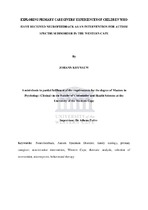Exploring primary caregivers' experiences of children who have received Neurofeedback as an intervention for Autism spectrum disorder in the Western Cape
Abstract
Autism Spectrum Disorder is a pervasive developmental disorder characterised by
impairment in communication skills and social interaction, including the presence of
stereotyped behaviour. Currently there is no cure for Autism Spectrum Disorder, resulting in
the use of several treatment modalities, for example pharmacological, behavioural and noninvasive
therapies, which include Neurofeedback, also called Neurotherapy,
Neurobiofeedback or Electroencephalogram. Neurofeedback biofeedback is a training
technique that presents the user with real-time feedback on brain wave activity. The objective
of this study was to explore the experiences of primary caregivers of children with Autism
Spectrum Disorder who have used the Neurofeedback intervention. This study used a
qualitative research methodology with an exploratory research design. The purpose of the
research was to explore experiences of primary caregivers whose autistic child experienced
Neurofeedback as an intervention. This study probed each primary caregiver's unique
experience, and allowed the primary caregivers the freedom to express their experiences. A
sample of five primary caregivers, comprising different racial and socioeconomic
backgrounds, was purposively selected in the Western Cape.

